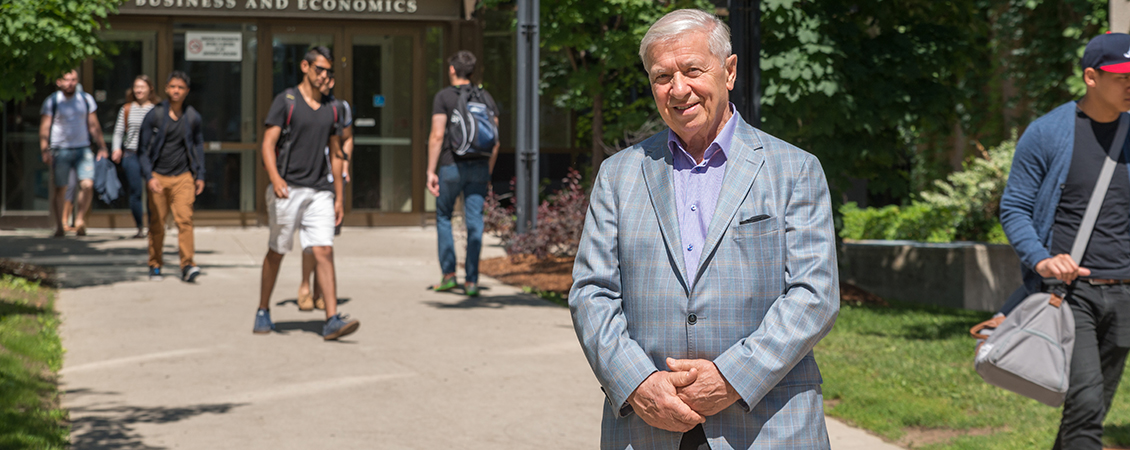
When Bernie Webber (BA ’64) arrived in Waterloo to study at what was then called Waterloo Lutheran University, he had no idea where he was going to live. Unfazed, the enterprising young student stepped off the train, checked into the Heuther Hotel in Uptown Waterloo and by the next day he had found a home on Regina Street.
That kind of resourcefulness has been a staple of Webber’s fascinating career, a diverse path that began in teaching and continued through various positions in the Ontario government and as a CEO in the insurance industry.
Today, Webber is the chairman of the board for Jazz.FM91, Canada’s only non-profit radio station devoted to jazz. And his connection to Laurier remains strong, not only as a proud alumnus himself, but through his grandson Douglas who studies at Laurier’s Brantford campus.
“I’ve always been a listener,” Webber answers when asked about his remarkable adaptability. “I’ve found that you learn an awful lot more by listening rather than forcing your opinion on everyone else.”
When Webber arrived at Waterloo Lutheran in the fall of 1961, the institution had just changed its name from Waterloo College and was still more than a decade away from becoming Wilfrid Laurier University. The Arts Building’s entrance off of University Avenue served as the main entry point to campus and construction on the current Laurier Library had recently begun.
“I was part of one of the first significantly expanded student bodies,” says Webber. “We had a freshman class of probably 100 and everybody thought ‘Oh, how are we going to handle all these people?’”
During his time at the university, Webber enjoyed the small class sizes and close relationships with his professors. In particular he forged lasting bonds with English Professor Flora Roy, economics Professor Max Stewart — who would remain a close friend of Webber’s following graduation — and history Professor Welf Heick.
“They really formulated a lot of my outlook on life. I can’t say enough about them,” Webber says, recalling anecdotes such as a scheduling error giving him a first-year English class the size of a graduate seminar with Roy, whose impact was especially profound.
As much as his time at WLU influenced his future, Webber was acquiring knowledge that would play a key role in his career even before he started university. Looking to make some money to pay for his post-secondary education, Webber worked for Atomic Energy, which was near his family home in Pembroke, Ont., for two and half years. He was assigned to the data processing department at a time when “people were saying ‘somebody told me there’s this thing called a computer that might be coming along’,” he says.
A decade later, Webber, just a few years out of university and working as a high school teacher in the Ottawa area, saw an ad for a job with the Ontario Ministry of Education. The ministry was looking to automate processes like scheduling and record-keeping and needed someone with a background in both education and computers. Webber was a perfect fit.
“They had some problem areas and, as I like to tell the story, within a year or so of me being there they got better, and people thought it was because of me,” he says with a laugh.
The resourceful Webber built a reputation as a troubleshooter and that initial position in the Ministry of Education led to a 26-year career in the provincial government that saw him hold positions in various ministries. One was as the deputy commissioner of the Ontario Insurance Commission, which made him several connections in the insurance industry and helped lead to his post-government career as a CEO in the property and casualty insurance industry.
Although he’d loved music all his life, playing in the Salvation Army band from a young age — even performing at Expo ’67 — Webber’s first experience in radio came in the late 1970s through his job in the Ministry of Citizenship and Culture. At the time, Ryerson University was running CJRT, a radio station that, in addition to classical and jazz programming, hosted Open College, an early form of distance education where lectures were broadcast and students wrote exams by mail. The ministry provided grants to the program and Webber became connected with the station.
When he left government in the early 1990s, Webber once again found himself as a perfect fit. “Shortly after I left the government, about three minutes after actually, my phone rang and they said ‘you’re coming on the board,’” he says.
Webber joined the volunteer board of CJRT in 1995 and became chair in 2000, leading a board that includes the widow of the late Oscar Peterson, one of the world’s most prominent jazz musicians. Shortly after Webber became chair, Open College was shutting down and the station became devoted exclusively to jazz, rebranding as Jazz.FM91.
Nearly 15 years later, Jazz.FM91 is among the best jazz radio stations in North America, competing with stations in New York and L.A. and drawing listeners from around the world. For Webber, being involved in Jazz.FM91, which proudly refers to itself as “more than a radio station,” acting as an unofficial gathering point for Canada’s jazz community, is a truly special experience — and something he’s happy to give back to.
That idea of giving back has been a driving force for Webber and something he’s instilled in his three children; Bernard, a forensics expert with the Peel police, and Jeanine and Michelle, who each have a PhD and are faculty members at the post-secondary level. Webber sums up his motivation by quoting Winston Churchill — of whom he is a longtime student and admirer, serving as a prominent member of the International Churchill Society — “you make a living by what you earn; you make a life by what you give.”